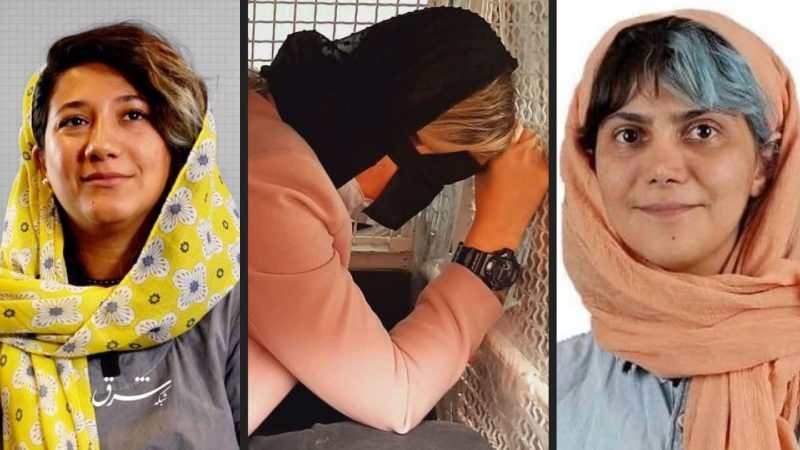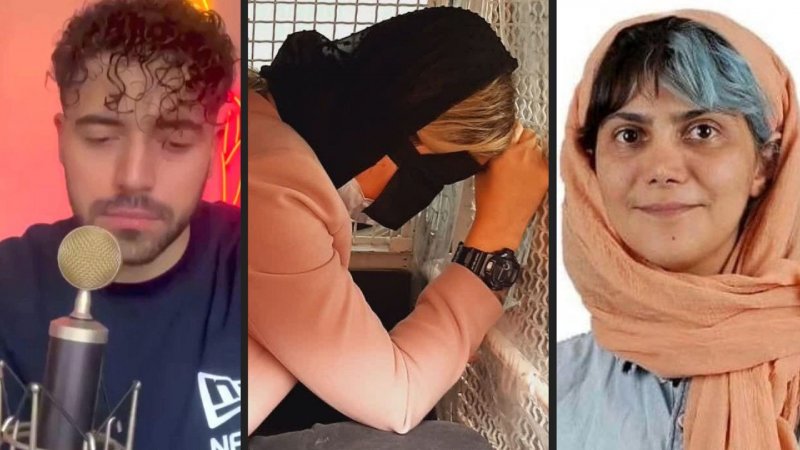Continuation of Nationwide Protests in Iran and the Rise in Arrests and Intimidation
With the continuation of protests in Iran, the wave of arrests of citizens, civil and political activists, students, journalists, and lawyers has also increased. According to human rights organizations, as of November 11, the number of detained citizens has been announced to exceed 15,000. Security forces are extensively arresting protesters individually or in groups, often with repetitive and vague accusations.
In one of the latest instances, the commander of the Imam Reza Corps in Fardis County announced that six citizens were arrested on charges of, as he put it, desecration and setting fire to the Fardis prayer hall. State-affiliated media reported on Thursday, November 10, the arrest of Elham Afkari, sister of the executed wrestler Navid Afkari, in Shiraz. These media claimed that Ms. Afkari had connections with the Iran International network and played a role in the recent protests. The Iran International network has denied any connection with Elham Afkari.
Accusations that could be directed at any protester, with no evidence or documentation provided by government agents. In another case, Mohammad Ali Azimi, a pilot for Kish Air, was arrested on the night of November 9 in front of the Ammar Basij base in Tehran and transferred to an unknown location. Besides the arrest of ordinary citizens, since the start of the nationwide protests following the death of Mahsa Amini, a Kurdish girl from Saqqez, in the morality police’s custody, many prominent individuals have also been arrested, from artists and athletes to journalists and civil, political, and student activists.
Arrests of Athletes
Kaveh Rezaei, Hamidreza Alighaseri, and Hossein Mahini, well-known football players, were all arrested after expressing sympathy with Mahsa Amini’s family and protesting the arrest of protesters in the early days of the protests, mainly on charges of inciting people to riot or supporting separatist groups.
Arrested Artists
Shervin Hajipour, singer of the song for Toomaj Salehi, protest rapper Emad Ghavidel, political and social rapper Zeynab Mousavi, stand-up comedian from Qom and creator of the character Emperor Kuzco, Saman Yasin, rapper from Kermanshah, and Nik Yousefi, photographer and filmmaker, are among the prominent artists arrested in the recent protests. The names of some poets and writers are also among the detainees, including Mona Borzouei, who was arrested on charges of inciting riots and aligning with the enemy.
Arrests in the Field of Journalism
Among them, many journalists and reporters have also been arrested. Marzieh Amiri and Niloufar Hamedi, reporters for Shargh newspaper, Elaheh Mohammadi, a reporter for Ham Mihan newspaper, Mandana Sadeghi, a journalist from Khuzestan, Yalda Moayeri, a news photographer, Nazila Maroufian, journalist and media activist, and Arya Jafari, an experienced press photographer, are among these detainees.

Widespread Arrests of Civil and Political Activists
Civil and political activists, as usual, are among the first detainees in most protests. A group whose dissent and criticism the government cannot tolerate, and they are sometimes arrested with extreme violence. Majid Tavakoli, Hossein Ronaghi, Mohammadreza Jalaeipour, Fatemeh Sepehri, Donya Rad, Arash Sadeghi, Hiwa Masoudi, Neda Naji, Pouran Nazemi, and Bahareh Hedayat are among the activists arrested in recent weeks.
Students at the Forefront of Arrests
The majority of the detainees may be students. Human rights organizations have reported that as of November 11, the number of detained students is 450. Naming the detained students is beyond the scope of this text, but most of these students were arrested either during the protests inside universities or at night in student dormitories.
Images published on social networks depict the violent arrest of many of these students. In response to the arrest of students, many students from universities across Iran have recently held gatherings and sit-ins to protest the arrest of their classmates. About a month ago, over 200 university professors issued a statement condemning the repression of protesting students and called on professors nationwide to support them.
Concerns About the Fate of Detainees
What is concerning about the detained individuals is the uncertainty of their fate or whereabouts. Many families say that despite continuous follow-up, security and law enforcement agents have not provided them with precise information. Meanwhile, reports have also emerged of harassment and abuse of detained women by security agents.
Moharebeh, a Charge with the Death Penalty
The Islamic Republic’s judiciary has begun the trial of some detainees from the recent protests. Last week, the Revolutionary Court accused Sahand Nourmohammadzadeh of moharebeh for setting fire to a trash bin and tire. Mr. Nourmohammadzadeh has denied his charges, but the penalty for the accusation against him can reach up to execution.
Emphasis on Speeding Up the Trials of Detainees
Islamic Republic officials insist that the trials of detainees from the recent protests be held quickly, possibly to intimidate protesters who continue to take to the streets despite ongoing arrests and crackdowns. Gholamhossein Mohseni Ejei, head of the Islamic Republic’s judiciary, has expressed agreement with the execution of some of the arrested protesters.
On Monday, November 7, Mr. Ejei said in the weekly meeting of the Supreme Judicial Council that someone who has taken up a firearm or cold weapon and used it to collaborate with the enemy or as an enemy agent to disrupt the country’s security and create fear, and in the meantime has also killed someone, can be sentenced to qisas (retribution) or execution, and other charges may also apply.
The charges referred to by Mr. Ejei are considered moharebeh under the laws of the Islamic Republic and are punishable by death. The day before Mr. Mohseni Ejei’s remarks, 227 members of parliament also called for the judiciary to carry out the qisas or execution sentence for the protesters labeled as mohareb.
Meanwhile, some commanders of the Revolutionary Guards have also claimed that the protesters are armed. Hassan Hassanzadeh, commander of the Mohammad Rasulullah Corps in Tehran, claimed that some of the arrested protesters have used firearms and cold weapons in an organized manner to increase violence and casualties.
From the collective statements of Islamic Republic officials regarding the handling of detainees from the recent protests and the emphasis of the head of the judiciary on holding trials as quickly as possible, it seems that unfair and hasty trials with severe sentences await the detainees, possibly similar to the sentences issued in the trials of opponents of the Islamic Republic in the 1980s.
In this context, other articles have been published on Iran Gate. If you wish to read them, we have provided a few examples for you.
- Nationwide Protests in Iran and the Right to Self-Determination
- How Not to Get Arrested in Protests
- Turbans: Yes or No
- Execution with the Intent to Intimidate

